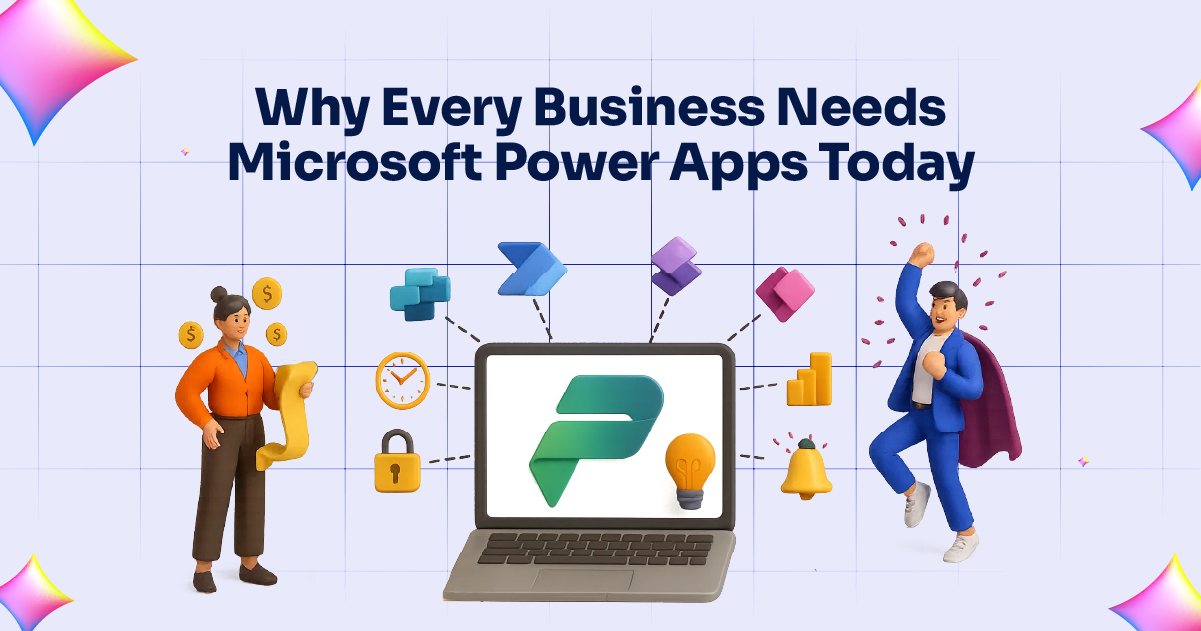
In today’s rapidly evolving business landscape, digital transformation is no longer optional; it’s a necessity. The pace at which technology is advancing means that businesses must innovate or risk falling behind. Microsoft Power Apps, a powerful low-code application development platform, is a critical enabler of this transformation. By providing businesses with the tools to build custom applications without requiring deep coding expertise, Power Apps offers a wide range of benefits that can drive efficiency, agility, and scalability.
Here’s why every business needs Microsoft Power Apps for their digital transformation journey.
1. Accelerated Application Development
One of the most significant barriers to digital transformation is the time and resources needed to develop custom applications. Traditional app development often requires highly skilled developers and months of work to create even basic applications. This can be particularly challenging for small and medium-sized enterprises (SMEs) that may lack the resources of larger corporations.
Microsoft Power Apps breaks this barrier by allowing businesses to develop custom applications quickly and easily using a low-code interface. This means that business analysts, project managers, or anyone with a basic understanding of the platform can create apps that address specific business needs. This drastically reduces development time, helping organizations launch new solutions and innovations faster.
For instance, a business could use Power Apps to create an internal application that tracks inventory in real-time or a customer-facing portal to handle orders, all within a matter of weeks, not months.
2. Enhanced Business Agility
In today’s world, business agility is paramount. The ability to quickly adapt to changing market conditions, customer demands, and technological advancements can be the difference between thriving and falling behind. Microsoft Power Apps gives businesses the flexibility to rapidly deploy and modify applications, allowing them to remain responsive to both internal and external changes.
Using Power Apps, businesses can integrate new functionalities and make adjustments to applications without needing to undergo long development cycles. For example, if a business needs to pivot to a new service offering or adjust its customer service processes, Power Apps enables it to quickly modify existing applications or create new ones in response to these shifts.
3. Cost Efficiency
Developing custom applications through traditional methods can be costly. The expense of hiring software developers, paying for complex infrastructure, and maintaining custom-built applications can quickly add up. However, with Microsoft Power Apps, businesses can drastically reduce development and maintenance costs.
Power Apps is built on a subscription-based pricing model that is far more affordable than traditional development processes. Because it’s a low-code platform, businesses also don’t need to hire specialized developers or invest in costly training for their employees. Instead, users can utilize existing internal resources, such as business analysts or even departmental managers, to design and implement apps, resulting in significant cost savings.
Additionally, Power Apps integrates seamlessly with other Microsoft products, including Microsoft 365 and Dynamics 365, which many businesses already use. This allows organizations to leverage their existing technology stack and avoid the need for separate systems, further reducing costs.
4. Seamless Integration with Microsoft Ecosystem
Microsoft Power Apps is part of the broader Microsoft Power Platform, which also includes Power BI (business analytics) and Power Automate (process automation). This integration allows businesses to unlock the full potential of their data and workflows by connecting apps, automating tasks, and generating actionable insights in a unified environment.
Moreover, Power Apps easily integrates with other Microsoft services such as SharePoint, OneDrive, and Microsoft Teams, creating a seamless user experience. For example, businesses can create custom apps that pull data from SharePoint lists or sync information across Teams channels, ensuring consistency across the organization. This integration fosters collaboration, data transparency, and process optimization.
5. Improved Customer Experiences
Delivering exceptional customer experiences has become a cornerstone of business success. Microsoft Power Apps empowers businesses to create custom applications that enhance customer interactions. Whether it’s developing mobile apps for field teams, self-service portals for customers, or apps that streamline order processing, Power Apps allows businesses to offer tailored solutions that meet customer expectations.
For example, a retail business could develop a mobile app for customers to track their orders, access promotions, and engage with loyalty programs. This personalized experience helps build stronger relationships with customers and enhances brand loyalty, which is crucial in a competitive marketplace.
6. Data-Driven Decision Making
In the age of digital transformation, data is one of the most valuable assets a business can have. With Microsoft Power Apps, businesses can collect, analyze, and use data more effectively. By integrating with Power BI, organizations can use the data gathered through their apps to generate real-time reports, dashboards, and visualizations that support data-driven decision-making.
For example, a sales team can use Power Apps to track customer interactions and view performance data in real time, helping them make better decisions about follow-ups, pricing, or promotional strategies. This ability to quickly access relevant data ensures that decisions are based on accurate, up-to-date information.
7. Security and Compliance
Security is always a top concern when implementing new technology. Microsoft Power Apps is built with enterprise-grade security features that help businesses protect sensitive data and comply with industry regulations. As part of the Microsoft ecosystem, Power Apps benefits from the same security and compliance protocols that businesses trust, including data encryption, multi-factor authentication, and role-based access controls.
Moreover, Power Apps allows businesses to customize their security measures according to their specific needs. For instance, businesses can set different access levels for users, ensuring that only authorized individuals can view or modify sensitive data.
Conclusion
Microsoft Power Apps is an indispensable tool for businesses looking to accelerate their digital transformation journey. It offers a wide range of benefits, from cost savings and agility to enhanced security and data integration. By enabling organizations to create custom applications quickly and easily, Power Apps empowers businesses to innovate and adapt in a fast-paced digital world.
For businesses seeking to harness the full potential of digital transformation, Microsoft Power Apps is a game-changer. With its low-code platform, integration capabilities, and robust security features, Power Apps is a critical component of any organization’s digital strategy.
To learn more about how Microsoft Power Apps can drive digital transformation, check out this link to explore more about Microsoft Power Apps.
By adopting Power Apps, businesses not only gain a competitive advantage but also future-proof their operations against the evolving demands of the digital age.
